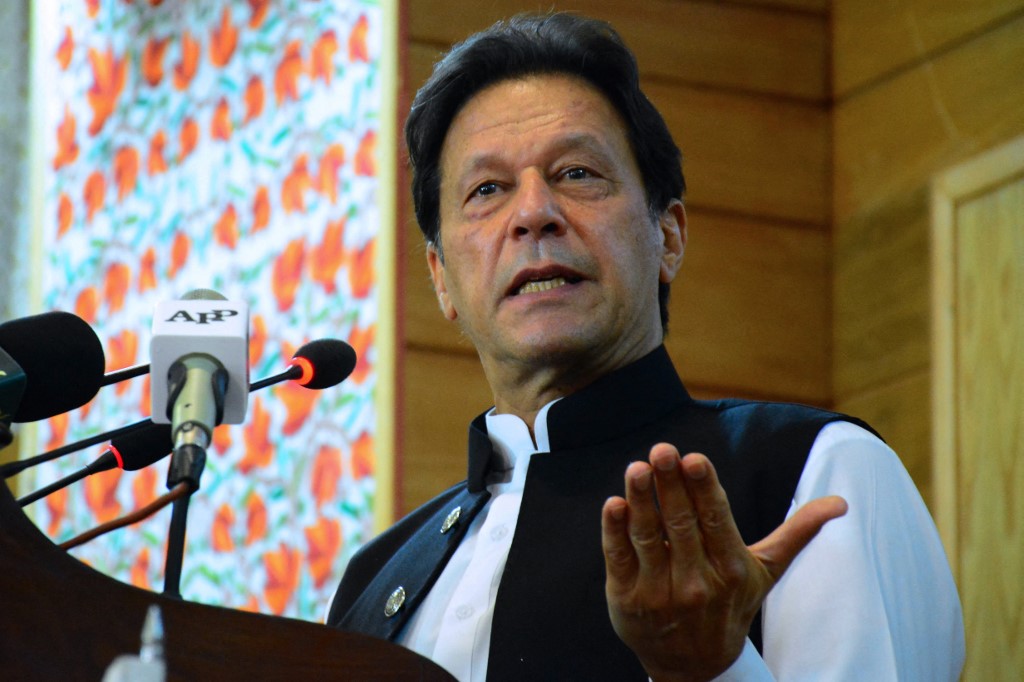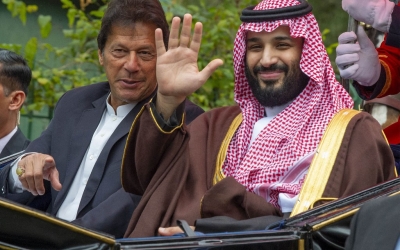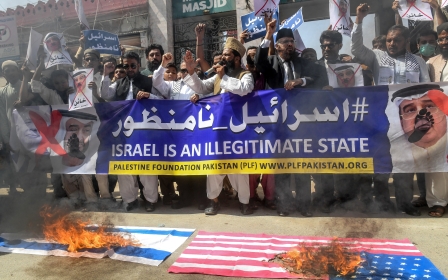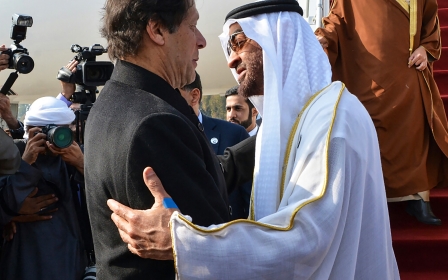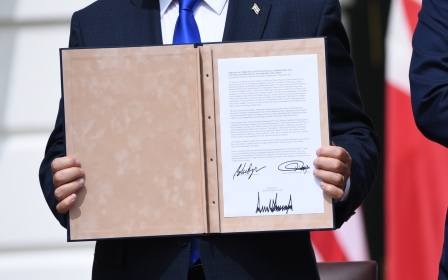Why Pakistan cannot recognise Israel
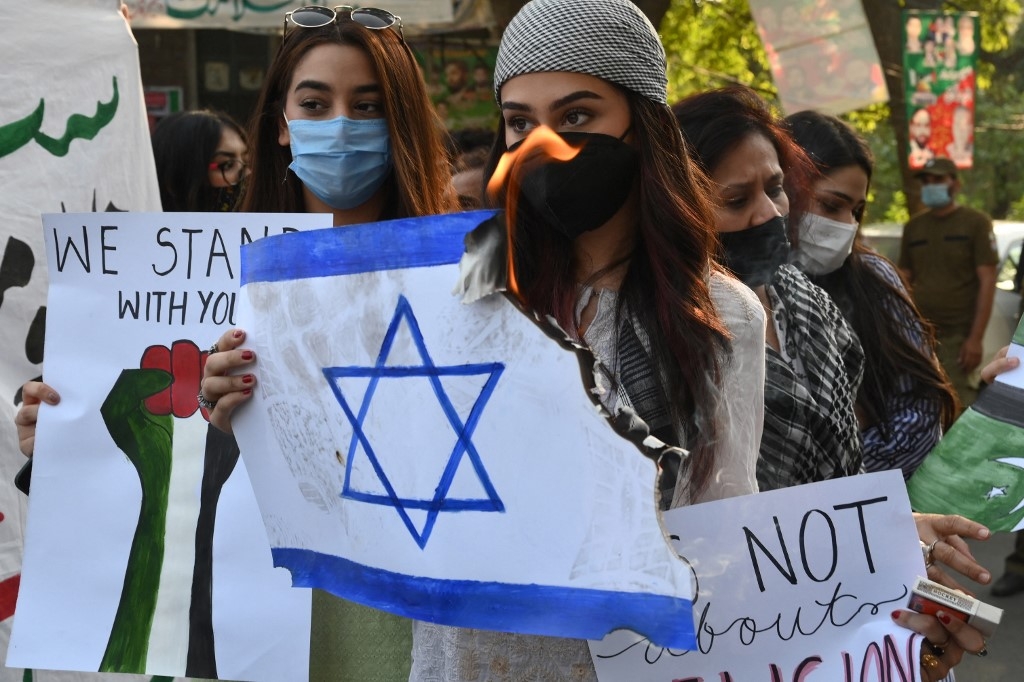
Towards the end of June, unrest erupted in Pakistan after a report from an Israeli source that a senior member of the Pakistani government - who was then a close aide to Prime Minister Imran Khan - had visited Tel Aviv secretly last year and held meetings with the higher echelons of the Knesset.
Though the government said the report was false, it nonetheless added fuel to the arguments that diplomatic engagements have continued between Pakistan and Israel into 2021. Adding to these circulating rumours was news of both countries partaking in Black Sea military exercises between 28 June and 10 July, co-hosted by the US and Ukrainian navies.
Pakistan cannot continue condemning India for oppressing Kashmiris, while concurrently befriending Israel
Over the past year, the sands have been shifting in the Middle East, with the UAE and Bahrain, among others, normalising relations with Israel. Discussion on Pakistan’s potential recognition of Israel - a once-taboo subject - has gained steam on various media platforms across the country.
It is no secret that Pakistan has long had covert relations with Israel. General Muhammad Zia-ul-Haq, the former Pakistani president, once called Pakistan and Israel ideological twins, and opened a back channel between Mossad and the Inter-Services Intelligence (ISI). The two agencies cooperated in the 1980s against the Soviets in Afghanistan.
In July 2003, then-President Pervez Musharraf called for a domestic deliberation on the prospects of opening diplomatic relations with Israel, suggesting that bilateral engagement could serve as a counterweight to India. Two years later, facilitated by Turkey, the foreign ministers of both states held what Tel Aviv hailed as a “huge breakthrough” in Istanbul.
New MEE newsletter: Jerusalem Dispatch
Sign up to get the latest insights and analysis on Israel-Palestine, alongside Turkey Unpacked and other MEE newsletters
And according to a WikiLeaks report published in 2010, the ISI contacted Israeli officials to head off potential attacks against Israeli targets in the wake of the 2008 Mumbai attacks.
Rumours denied
On the surface, at least, the debate seemed to have taken a back seat, until in October 2018, with a new Pakistani government in place, allegations were raised that an Israeli business jet had remained on the ground in Islamabad for almost 10 hours. The Pakistani government denied the reports.
Then, after the Gulf rapprochement with Israel, there were reports last year that Pakistan was being pressured by powerful, “friendly” countries to do the same. In an interview, Khan indicated as much, and while he refused to name the countries in question, they were widely believed to be Saudi Arabia and the UAE.
During the Covid-19 pandemic, the UAE’s ban on issuing work visas to Pakistanis was also linked to Islamabad’s refusal to recognise Israel, since India - which has had more coronavirus cases - was not added to the list of mostly Muslim-majority countries refused entry by the Emirates.
The next month, former Jamiat Ulema-e-Islam leader Maulana Ajmal Qadri said that former prime minister Nawaz Sharif had sent him to Tel Aviv on a “study tour”, where he held talks with various Israeli officials.
Time and again, the Pakistani leadership has vehemently denied all rumours pertaining to the subject of Israel. The reasons can be summed up in three main categories.
First and foremost is Kashmir. Pakistan has always built its case around the parallels between Israeli atrocities against Palestinians and Indian abuses against Kashmiris. Pakistan cannot continue condemning India for oppressing Kashmiris, while concurrently befriending Israel.
Advocacy for Kashmir is a cornerstone of Pakistan’s foreign policy. During the recent escalation of violence in Gaza, Pakistan was at the forefront in raising awareness and backing calls for a ceasefire. The Pakistani leadership has made it clear that under no circumstances will it even think of recognising Israel until peace is achieved in Palestine. Indian atrocities against Kashmiris reportedly take their imprint from Israeli actions in Palestine.
Relations with Iran
The second reason, by virtue of geographical proximity, is Iran. Pakistan has been making visible strides to improve relations with its western neighbour, including through the Pakistani foreign minister’s visit to Tehran earlier this year, which included a discussion on strengthening cross-border markets.
In light of the China-Iran deal announced in March, Iran is now officially part of China’s vast Belt and Road Initiative (BRI). The China-Pakistan Economic Corridor, the initiative’s flagship project, will unquestionably complement BRI projects in Iran. Given Washington’s visible angst over China’s economic rise, and the fact that both the US and Israel consider Iran an unwavering enemy - not to mention their strategic nexus with India - Islamabad can ill afford any relationship with Tel Aviv.
The third reason is Pakistan’s domestic audience. In the aftermath of the signing of the Abraham Accords, tens of thousands of Pakistanis protested against the normalisation deal. This past January, a “million-man march” took place in Karachi against the prospect of Israel-Pakistan normalisation, making clear that a flood of public backlash and heightened security risks would follow any such move.
If Islamabad were to recognise Israel, it would appear as blatant hypocrisy in the face of Pakistan’s protests against India, providing undesired ammunition to hardliners within the country.
For Pakistan, the opportunity cost of officiating ties with Israel is too great. Pakistan has recently made strides in line with its foreign policy pivot towards "geo-economics" - a focus on regional integration and sustainable development - something that is no doubt helping to augment a better international image. Any misdirected step at this juncture would be akin to shooting itself in the foot.
The views expressed in this article belong to the author and do not necessarily reflect the editorial policy of Middle East Eye.
Middle East Eye delivers independent and unrivalled coverage and analysis of the Middle East, North Africa and beyond. To learn more about republishing this content and the associated fees, please fill out this form. More about MEE can be found here.



